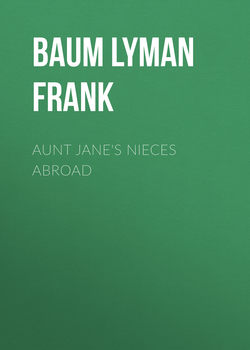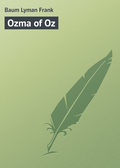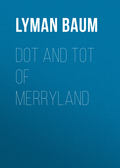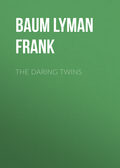PREFATORY:
The author is pleased to be able to present a sequel to "Aunt Jane's Nieces," the book which was received with so much favor last year. Yet it is not necessary one should have read the first book to fully understand the present volume, the characters being taken to entirely new scenes.
The various foreign localities are accurately described, so that those who have visited them will recognize them at once, while those who have not been so fortunate may acquire a clear conception of them. It was my good fortune to be an eye witness of the recent great eruption of Vesuvius.
Lest I be accused of undue sensationalism in relating the somewhat dramatic Sicilian incident, I will assure my reader that the story does not exaggerate present conditions in various parts of the island. In fact, Il Duca and Tato are drawn from life, although they did not have their mountain lair so near to Taormina as I have ventured to locate it. Except that I have adapted their clever system of brigandage to the exigencies of this story, their history is truly related. Many who have travelled somewhat outside the beaten tracks in Sicily will frankly vouch for this statement.
Italy is doing its best to suppress the Mafia and to eliminate brigandage from the beautiful islands it controls, but so few of the inhabitants are Italians or in sympathy with the government that the work of reformation is necessarily slow. Americans, especially, must exercise caution in travelling in any part of Sicily; yet with proper care not to tempt the irresponsible natives, they are as safe in Sicily as they are at home.
Aunt Jane's nieces are shown to be as frankly adventurous as the average clear headed American girl, but their experiences amid the environments of an ancient and still primitive civilization are in no wise extraordinary.
Edith Van Dyne.
CHAPTER I
THE DOYLES ARE ASTONISHED
It was Sunday afternoon in Miss Patricia Doyle's pretty flat at 3708 Willing Square. In the small drawing room Patricia – or Patsy, as she preferred to be called – was seated at the piano softly playing the one "piece" the music teacher had succeeded in drilling into her flighty head by virtue of much patience and perseverance. In a thick cushioned morris-chair reclined the motionless form of Uncle John, a chubby little man in a gray suit, whose features were temporarily eclipsed by the newspaper that was spread carefully over them. Occasionally a gasp or a snore from beneath the paper suggested that the little man was "snoozing" as he sometimes gravely called it, instead of listening to the music.
Major Doyle sat opposite, stiffly erect, with his admiring eyes full upon Patsy. At times he drummed upon the arms of his chair in unison with the music, nodding his grizzled head to mark the time as well as to emphasize his evident approbation. Patsy had played this same piece from start to finish seven times since dinner, because it was the only one she knew; but the Major could have listened to it seven hundred times without the flicker of an eyelash. It was not that he admired so much the "piece" the girl was playing as the girl who was playing the "piece." His pride in Patsy was unbounded. That she should have succeeded at all in mastering that imposing looking instrument – making it actually "play chunes" – was surely a thing to wonder at. But then, Patsy could do anything, if she but tried.
Suddenly Uncle John gave a dreadful snort and sat bolt upright, gazing at his companions with a startled look that melted into one of benign complacency as he observed his surroundings and realized where he was. The interruption gave Patsy an opportunity to stop playing the tune. She swung around on the stool and looked with amusement at her newly awakened uncle.
"You've been asleep," she said.
"No, indeed; quite a mistake," replied the little man, seriously. "I've only been thinking."
"An' such beautchiful thoughts," observed the Major, testily, for he resented the interruption of his Sunday afternoon treat. "You thought 'em aloud, sir, and the sound of it was a bad imithation of a bullfrog in a marsh. You'll have to give up eating the salad, sir."
"Bah! don't I know?" asked Uncle John, indignantly.
"Well, if your knowledge is better than our hearing, I suppose you do," retorted the Major. "But to an ignorant individual like meself the impression conveyed was that you snored like a man that has forgotten his manners an' gone to sleep in the prisence of a lady."
"Then no one has a better right to do that," declared Patsy, soothingly; "and I'm sure our dear Uncle John's thoughts were just the most beautiful dreams in the world. Tell us of them, sir, and we'll prove the Major utterly wrong."
Even her father smiled at the girl's diplomacy, and Uncle John, who was on the verge of unreasonable anger, beamed upon her gratefully.
"I'm going to Europe," he said.
The Major gave an involuntary start, and then turned to look at him curiously.
"And I'm going to take Patsy along," he continued, with a mischievous grin.
The Major frowned.
"Conthrol yourself, sir, until you are fully awake," said he. "You're dreaming again."
Patsy swung her feet from side to side, for she was such a little thing that the stool raised her entirely off the floor. There was a thoughtful look on her round, freckled face, and a wistful one in her great blue eyes as the full meaning of Uncle John's abrupt avowal became apparent.
The Major was still frowning, but a half frightened expression had replaced the one of scornful raillery. For he, too, knew that his eccentric brother-in-law was likely to propose any preposterous thing, and then carry it out in spite of all opposition. But to take Patsy to Europe would be like pulling the Major's eye teeth or amputating his good right arm. Worse; far worse! It would mean taking the sunshine out of her old father's sky altogether, and painting it a grim, despairing gray.
But he resolved not to submit without a struggle.
"Sir," said he, sternly – he always called his brother-in-law "sir" when he was in a sarcastic or reproachful mood – "I've had an idea for some time that you were plotting mischief. You haven't looked me straight in the eye for a week, and you've twice been late to dinner. I will ask you to explain to us, sir, the brutal suggestion you have just advanced."
Uncle John laughed. In the days when Major Doyle had thought him a poor man and in need of a helping hand, the grizzled old Irishman had been as tender toward him as a woman and studiously avoided any speech or epithet that by chance might injure the feelings of his dead wife's only brother. But the Major's invariable courtesy to the poor or unfortunate was no longer in evidence when he found that John Merrick was a multi-millionaire with a strongly defined habit of doing good to others and striving in obscure and unconventional ways to make everybody around him happy. His affection for the little man increased mightily, but his respectful attitude promptly changed, and a chance to reprove or discomfit his absurdly rich brother-in-law was one of his most satisfactory diversions. Uncle John appreciated this, and holding the dignified Major in loving regard was glad to cross swords with him now and then to add variety to their pleasant relations.
"It's this way, Major Doyle," he now remarked, coolly. "I've been worried to death, lately, over business matters; and I need a change."
"Phoo! All your business is attended to by Isham, Marvin & Co. You've no worry at all. Why, we've just made you a quarter of a million in C.H. & D's."
The "we" is explained by stating that the Major held an important position in the great banking house – a position Mr. Merrick had secured for him some months previously.
"That's it!" said Uncle John. "You've made me a quarter of a million that I don't want. The C.H. & D. stocks were going to pieces when I bought them, and I had reason to hope I'd lose a good round sum on them. But the confounded luck turned, and the result is an accumulation of all this dreadful money. So, my dear Major, before I'm tempted to do some-other foolish thing I've determined to run away, where business can't follow me, and where by industry and perseverance I can scatter some of my ill-gotten gains."
The Major smiled grimly.
"That's Europe, right enough," he said. "And I don't object, John, to your going there whenever you please. You're disgracefully countryfied and uninformed for a man of means, and Europe'll open your eyes and prove to you how insignificant you really are. I advise you to visit Ireland, sor, which I'm reliably informed is the centhral jewel in Europe's crown of beauty. Go; and go whinever you please, sor; but forbear the wickedness of putting foolish thoughts into our Patsy's sweet head. She can't go a step, and you know it. It's positive cruelty to her, sir, to suggest such a thing!"
The Major's speech had a touch of the brogue when he became excited, but recovered when he calmed down.
"Why, you selfish old humbug!" cried Uncle John, indignantly. "Why can't she go, when there's money and time to spare? Would you keep her here to cuddle and spoil a vigorous man like yourself, when she can run away and see the world and be happy?"
"It's a great happiness to cuddle the Major," said Patsy, softly; "and the poor man needs it as much as he does his slippers or his oatmeal for breakfast."
"And Patsy has the house to look after," added the Major, complacently.
Uncle John gave a snort of contempt.
"For an unreasonable man, show me an Irishman," he remarked. "Here you've been telling me how Europe is an education and a delight, and in the next breath you deliberately deprive your little daughter, whom you pretend to love, of the advantages she might gain by a trip abroad! And why? Just because you want her yourself, and might be a bit lonesome without her. But I'll settle that foolishness, sir, in short order. You shall go with us."
"Impossible!" ejaculated the Major. "It's the time of year I'm most needed in the office, and Mr. Marvin has been so kind and considerate that I won't play him a dirty trick by leaving him in the lurch."
Patsy nodded approval.
"That's right, daddy," she said.
Uncle John lay back in the chair and put the newspaper over his face again. Patsy and her father stared at one another with grave intentness. Then the Major drew out his handkerchief and mopped his brow.
"You'd like to go, mavourneen?" he asked, softly.
"Yes, daddy; but I won't, of course."
"Tut-tut! don't you go putting yourself against your old father's will, Patsy. It's not so far to Europe," he continued, thoughtfully, "and you won't be away much longer than you were when you went to Elmhurst after Aunt Jane's money – which you didn't get. Mary takes fine care of our little rooms, and doubtless I shall be so busy that I won't miss you at all, at all."
"Daddy!"
She was in his lap, now, her chubby arms clasped around his neck and her soft cheek laid close beside his rough and ruddy one.
"And when ye get back, Patsy darlin'," he whispered, tenderly stroking her hair, "the joy of the meeting will make up for all that we've suffered. It's the way of life, mavourneen. Unless a couple happens to be Siamese twins, they're bound to get separated in the course of events, more or less, if not frequently."
"I won't go, daddy."
"Oh, yes you will. It's not like you to be breakin' my heart by stayin' home. Next week, said that wicked old uncle – he remoinds me of the one that tried to desthroy the Babes in the Woods, Patsy dear. You must try to reclaim him to humanity, for I'm hopin' there's a bit of good in the old rascal yet." And he looked affectionately at the round little man under the newspaper.
Uncle John emerged again. It was wonderful how well he understood the Doyle family. His face was now smiling and wore a look of supreme satisfaction.
"Your selfishness, my dear Major," said he, "is like the husk on a cocoanut. When you crack it there's plenty of milk within – and in your case it's the milk of human kindness. Come! let's talk over the trip."
CHAPTER II
UNCLE JOHN MAKES PLANS
"The thought came to me a long time ago," Uncle John resumed; "but it was only yesterday that I got all the details fixed and settled in my mind. I've been a rough old duffer, Patsy, and in all my hard working life never thought of such a thing as travelling or enjoying myself until I fell in with you, and you taught me how pleasant it is to scatter sunshine in the hearts of others. For to make others happy means a lot of joy for yourself – a secret you were trying to keep from me, you crafty young woman, until I discovered it by accident. Now, here I am with three nieces on my hands – "
"You may say two, sir," interrupted the Major. "Patsy can take care of herself."
"Hold your tongue," said Uncle John. "I say I've got three nieces – as fine a trio of intelligent, sweet and attractive young women as you'll run across in a month of Sundays. I dare you to deny it, sir. And they are all at an age when an European trip will do them a world of good. So off we go, a week from Tuesday, in the first-class steamer 'Princess Irene,' bound from New York for the Bay of Naples!"
Patsy's eyes showed her delight. They fairly danced.
"Have you told Beth and Louise?" she asked.
His face fell.
"Not yet," he said. "I'd forgotten to mention it to them."
"For my part," continued the girl, "I can get ready in a week, easily. But Beth is way out in Ohio, and we don't know whether she can go or not."
"I'll telegraph her, and find out," said Uncle John.
"Do it to-day," suggested the Major.
"I will."
"And to-morrow you must see Louise," added Patsy. "I'm not sure she'll want to go, dear. She's such a social butterfly, you know, that her engagements may keep her at home."
"Do you mean to say she's engaged?" asked Mr. Merrick, aghast.
"Only for the parties and receptions, Uncle. But it wouldn't surprise me if she was married soon. She's older than Beth or me, and has a host of admirers."
"Perhaps she's old enough to be sensible," suggested the Major.
"Well, I'll see her and her mother to-morrow morning," decided Uncle John, "and if she can't find time for a trip to Europe at my expense, you and Beth shall go anyhow – and we'll bring Louise a wedding present."
With this declaration he took his hat and walking stick and started for the telegraph station, leaving Patsy and her father to canvass the unexpected situation.
John Merrick was sixty years old, but as hale and rugged as a boy of twenty. He had made his vast fortune on the Pacific Coast and during his years of busy activity had been practically forgotten by the Eastern members of his family, who never had credited him with sufficient ability to earn more than a precarious livelihood. But the man was shrewd enough in a business way, although simple almost to childishness in many other matters. When he returned, quite unheralded, to end his days "at home" and employ his ample wealth to the best advantage, he for a time kept his success a secret, and so learned much of the dispositions and personal characteristics of his three nieces.
They were at that time visiting his unmarried sister, Jane, at her estate at Elmhurst, whither they had been invited for the first time; and in the race for Aunt Jane's fortune he watched the three girls carefully and found much to admire in each one of them. Patsy Doyle, however, proved exceptionally frank and genuine, and when Aunt Jane at last died and it was found she had no estate to bequeath, Patsy proved the one bright star in the firmament of disappointment. Supposing Uncle John to be poor, she insisted upon carrying him to New York with her and sharing with him the humble tenement room in which she lived with her father – a retired veteran who helped pay the family expenses by keeping books for a mercantile firm, while Patsy worked in a hair-dresser's shop.
It was now that Uncle John proved a modern fairy godfather to Aunt Jane's nieces – who were likewise his own nieces. The three girls had little in common except their poverty, Elizabeth De Graf being the daughter of a music teacher, in Cloverton, Ohio, while Louise Merrick lived with her widowed mother in a social atmosphere of the second class in New York, where the two women frankly intrigued to ensnare for Louise a husband who had sufficient means to ensure both mother and daughter a comfortable home. In spite of this worldly and unlovely ambition, which their circumstances might partially excuse, Louise, who was but seventeen, had many good and womanly qualities, could they have been developed in an atmosphere uninfluenced by the schemes of her vain and selfish mother.
Uncle John, casting aside the mask of poverty, came to the relief of all three girls. He settled the incomes of substantial sums of money upon both Beth and Louise, making them practically independent. For Patsy he bought a handsome modern flat building located at 3708 Willing Square, and installed her and the Major in its cosiest apartment, the rents of the remaining flats giving the Doyles an adequate income for all time to come. Here Uncle John, believing himself cordially welcome, as indeed he was, made his own home, and it required no shrewd guessing to arrive at the conclusion that little Patsy was destined to inherit some day all his millions.
The great banking and brokerage firm of Isham, Marvin & Co. had long managed successfully John Merrick's vast fortune, and at his solicitation it gave Major Doyle a responsible position in its main office, with a salary that rendered him independent of his daughter's suddenly acquired wealth and made him proud and self-respecting.
Money had no power to change the nature of the Doyles. The Major remained the same simple, honest, courteous yet brusque old warrior who had won Uncle John's love as a hard working book-keeper; and Patsy's bright and sunny disposition had certain power to cheer any home, whether located in a palace or a hovel.
Never before in his life had Uncle John been so supremely happy, and never before had Aunt Jane's three nieces had so many advantages and pleasures. It was to confer still further benefits upon these girls that their eccentric uncle had planned this unexpected European trip.
His telegram to Elizabeth was characteristic:
"Patsy, Louise and I sail for Europe next Tuesday. Will you join us as my guest? If so, take first train to New York, where I will look after your outfit. Answer immediately."
That was a message likely to surprise a country girl, but it did not strike John Merrick as in any way extraordinary. He thought he could depend upon Beth. She would be as eager to go as he was to have her, and when he had paid for the telegram he dismissed the matter from further thought.
Next morning Patsy reminded him that instead of going down town he must personally notify Louise Merrick of the proposed trip; so he took a cross-town line and arrived at the Merrick's home at nine o'clock.
Mrs. Merrick was in a morning wrapper, sipping her coffee in an upper room. But she could not deny herself to Uncle John, her dead husband's brother and her only daughter's benefactor (which meant indirectly her own benefactor), so she ordered the maid to show him up at once.
"Louise is still sweetly sleeping," she said, "and won't waken for hours yet."
"Is anything wrong with her?" he asked, anxiously.
"Oh, dear, no! but everyone does not get up with the milkman, as you do, John; and the dear child was at the opera last night, which made her late in getting home."
"Doesn't the opera let out before midnight, the same as the theatres?" he asked.
"I believe so; but there is the supper, afterward, you know."
"Ah, yes," he returned, thoughtfully. "I've always noticed that the opera makes folks desperately hungry, for they flock to the restaurants as soon as they can get away. Singular, isn't it?"
"Why, I never thought of it in that light."
"But Louise is well?"
"Quite well, thank you."
"That's a great relief, for I'm going to take her to Europe with me next week," he said.
Mrs. Merrick was so astonished that she nearly dropped her coffee-cup and could make no better reply than to stare blankly at her brother-in-law.
"We sail Tuesday," continued Uncle John, "and you must have my niece ready in time and deliver her on board the 'Princess Irene' at Hoboken at nine o'clock, sharp."
"But John – John!" gasped Mrs. Merrick, feebly, "it will take a month, at least, to make her gowns, and – "
"Stuff and rubbish!" he growled. "That shows, Martha, how little you know about European trips. No one makes gowns to go abroad with; you buy 'em in Paris to bring home."
"Ah, yes; to be sure," she muttered. "Perhaps, then, it can be done, if Louise, has no other engagements."
"Just what Patsy said. See here, Martha, do you imagine that any girl who is half human could have engagements that would keep her from Europe?"
"But the requirements of society – "
"You'll get me riled, pretty soon, Martha; and if you do you'll wish you hadn't."
This speech frightened the woman. It wouldn't do to provoke Uncle John, however unreasonable he happened to be. So she said, meekly:
"I've no doubt Louise will be delighted to go, and so will I."
"You!"
"Why – why – whom do you intend taking?"
"Just the three girls – Aunt Jane's three nieces. Also mine."
"But you'll want a chaperone for them."
"Why so?"
"Propriety requires it; and so does ordinary prudence. Louise, I know, will be discreet, for it is her nature; but Patsy is such a little flyaway and Beth so deep and demure, that without a chaperone they might cause you a lot of trouble."
Uncle John grew red and his eyes flashed.
"A chaperone!" he cried, contemptuously; "not any in mine, Martha Merrick. Either we young folks go alone, without any death's head to perpetually glower at us, or we don't go at all! Three better girls never lived, and I'll trust 'em anywhere. Besides that, we aren't going to any of your confounded social functions; we're going on a reg'lar picnic, and if I don't give those girls the time of their lives my name ain't John Merrick. A chaperone, indeed!"
Mrs. Merrick held up her hands in horror.
"I'm not sure, John," she gasped, "that I ought to trust my dear child with an uncle who disregards so openly the proprieties."
"Well, I'm sure; and the thing's settled," he said, more calmly. "Don't worry, ma'am. I'll look after Patsy and Beth, and Louise will look after all of us – just as she does after you – because she's so discreet. Talk about your being a chaperone! Why, you don't dare say your soul's your own when Louise is awake. That chaperone business is all humbuggery – unless an old uncle like me can be a chaperone. Anyhow, I'm the only one that's going to be appointed. I won't wait for Louise to wake up. Just tell her the news and help her to get ready on time. And now, I'm off. Good morning, Martha."
She really had no words of protest ready at hand, and it was long after queer old John Merrick had gone away that she remembered a dozen effective speeches that she might have delivered.
"After all," she sighed, taking up her cup again, "it may be the best thing in the world for Louise. We don't know whether that young Weldon, who is paying her attentions just now, is going to inherit his father's money or not. He's been a bit wild, I've heard, and it is just as well to postpone any engagement until we find out the facts. I can do that nicely while my sweet child is in Europe with Uncle John, and away from all danger of entanglements. Really, it's an ill wind that blows no good! I'll go talk with Louise."









